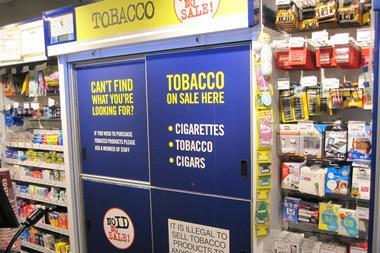The government has rejected plans to introduce a tobacco licensing scheme for retailers.
Responding to its recent consultation on reducing the illicit trade, the government said it was “difficult to make a strong case for retailer licensing for anti-illicit purposes only”.
Sales of illicit tobacco through legitimate retailers represented only a proportion of total illicit sales and most retailers were “fully compliant with the law in this area,” the response document said.
The costs of introducing a national HMRC-administered scheme would be “disproportionate” and HMRC already applied a number of sanctions against retailers found selling illicit tobacco, including financial penalties and removal of alcohol licences, it said.
“It would also be burdensome for those businesses already registered under the Scottish, Welsh or Northern Irish health schemes to require them to apply for a second national registration for the sale of tobacco products.
“Some interesting suggestions were made about combining enforcement activities for different aspects of tobacco control and funding options for this work, and the government will continue to consider these.
“The forthcoming track and trace requirements are also likely to add additional supply chain controls and some form of registration for at least part of the tobacco supply chain,” it added.
The Association of Convenience Stores (ACS) welcomed the decision but demanded clarity about the potential impact of track and trace requirements on retailers.
ACS chief executive James Lowman said: “We are pleased that the government has listened to the views of retailers and rejected plans to introduce a burdensome licensing system on retailers that would actually have little impact on the illicit tobacco market.
“We urge HMRC and trading standards officers to make better use of existing sanctions so any retailer found trading illicit goods is stopped from trading.
“We now need clarity from the UK government and EU commission about the implications of track and trace regulations for retailers.
“We believe these regulations would place a significant cost and time burden on retailers, requiring them to register and pay for identifier codes for both their overall business and each individual store, and produce them each time they purchase tobacco.
“We will be working with the UK government and EU commission to make these regulations workable.”
















No comments yet